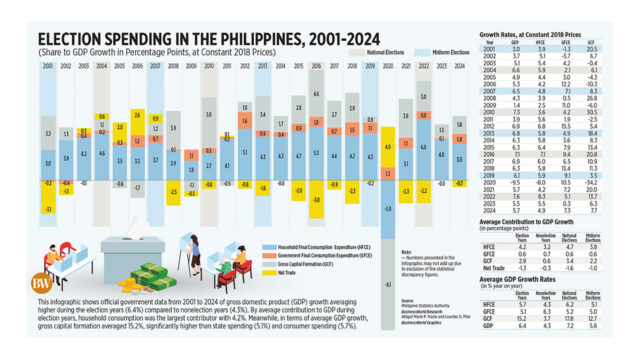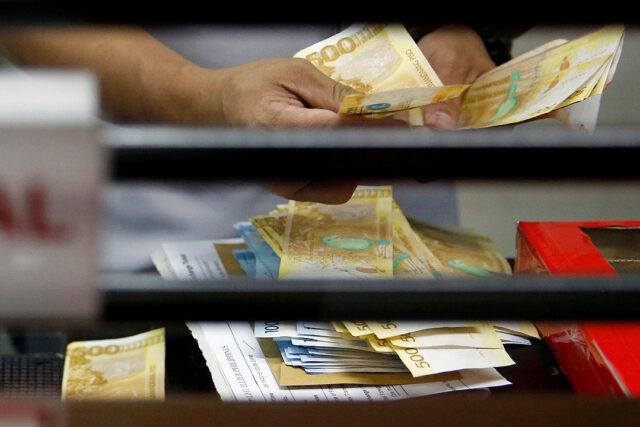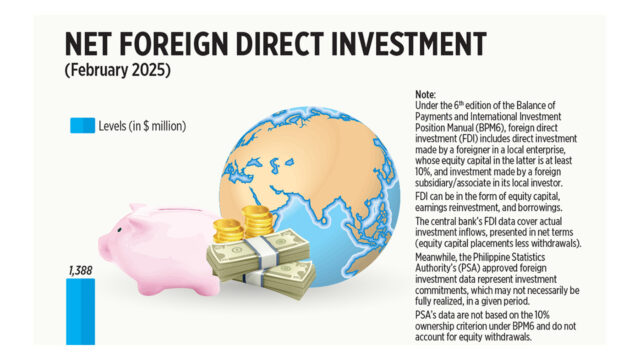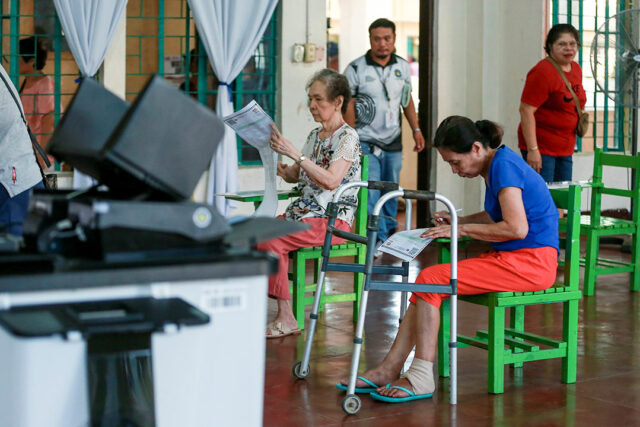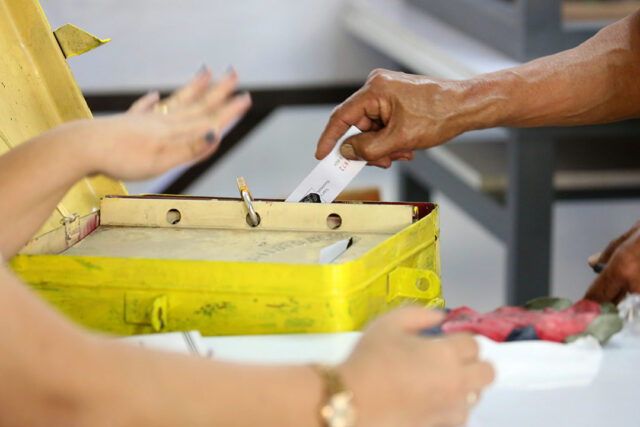By Chloe Mari A. Hufana, Kenneth Christiane L. Basilio, and Adrian H. Halili, Reporters
THE Commission on Elections (Comelec) said on Monday there was no failure of elections in the 2025 midterm elections despite sweeping issues on faulty automated counting machines (ACMs), disinformation, and tensions in high-risk areas.
 Speaking at The Manila Hotel, Chairman George Erwin M. Garcia said an election failure means electoral items did not arrive on time and teachers, who served as electoral board members, did not arrive.
Speaking at The Manila Hotel, Chairman George Erwin M. Garcia said an election failure means electoral items did not arrive on time and teachers, who served as electoral board members, did not arrive.
Mr. Garcia dismissed claims that ACMs issued receipts that contradicted voters’ shaded choices, saying there is no evidence to support such allegations. He added that voters may have simply forgotten which candidates they selected.
He said the reported issues will be addressed during the ballot review, noting that the ballots will be manually counted during the random manual audit.
The polls chief said 311 ACMs were replaced but emphasized there were no major issues during the entire day as they have 16,000 spare voting machines.
“So far, we haven’t seen any major technical issues,” Mr. Garcia told reporters in Filipino after he cast his ballot in Indang, Cavite on Monday morning.
The poll chief said the process for an individual who knows who he is voting for can finish voting using the machine in less than three minutes.
As of 2:30 p.m., election watchdog Legal Network for Truthful Elections (LENTE) logged over 60 cases of malfunctions related to ACMs.
Among recurring issues were ballot rejection, scanner cleaning, and jams in the feeding of ballots, and release of voter receipts. Malfunctions were observed in Metro Manila and 20 other provinces.
Earlier, the group said that among the most common problems involved sensitive scanners that frequently rejected ballots. The Electoral Board (EB) had to temporarily pause operations to clean the scanner, resulting in delays and long queues.
Cristian Gaebriel C. Navarro, 24, said he had to push his freelance work for the day after the ACM at his polling precinct in Antipolo City, Rizal malfunctioned for about 20 minutes, disrupting the voting process.
“There was a problem with the voting machine. It lasted for about 15 to 20 minutes,” he told BusinessWorld in an interview after he voted.
“Instead of being able to go home and get to work, it caused a delay.”
Despite enduring nearly two hours in sweltering, humid weather, Mr. Navarro remained determined to cast his ballot, selecting candidates he believes can tackle key issues in the Philippines, including poverty, food security and inadequate school facilities.
“I hope they can create laws that will help many people,” he said.
The election watchdog added that voters have reported discrepancies in their choices versus their voter’s receipts, citing cases in Quezon City, Cainta, Parañaque, and Laguna.
“The Electoral Board failed to inform the voters of their right to challenge the voter’s receipt,” it added.
LENTE said that voters encountering this problem should file an objection, by informing the EB of the discrepancy and then signing the back of the voter’s receipt.
“The electoral board should then attach the contested voter’s receipt in the minutes. This can then be later used as evidence in a subsequent election protest,” the group added.
This led to calls for Comelec to conduct a manual recount of all votes cast in precincts nationwide to address concerns over possible poll rigging linked to discrepancies in ACM software versions.
The poll body should use the results of the manual recount instead of automated vote tallies if inconsistencies arise, the Makabayan said in a statement on Monday.
“We see a lack of transparency throughout the automated election process,” it said in Filipino. “The integrity of the software is questionable, and we continue to receive reports of overvoting, under voting and incorrect vote readings.”
Comelec on Sunday dispelled concerns linked to the difference in software versions, saying the source code used by ACMs is the same hash code as the one checked by independent auditors.
The Philippines first held its automated elections in 2010 after former President Gloria Macapagal-Arroyo signed in 2007 a law mandating the country to make use of automated election systems.
“We have always maintained that automation without transparency is a threat to democracy,” Roland G. Simbulan, chairman of the Center for People Empowerment in Governance, said in a separate statement.
“The recurring failures of ACMs – especially during the most critical hours of voting – should compel Comelec to seriously consider restoring manual counting at the precinct level where the votes are cast and witnessed,” he added.
VIOLENCE AND INTIMIDATION
Mr. Garcia also said this year’s election recorded the lowest red category area, compared to the last two polls.
“We have the lowest red category areas this year with 34. Compared to 2019 and 2022, this is the lowest,” he said in Filipino. “An election marred by violence, to us, is not acceptable.”
Earlier in the day, Mr. Garcia said there are attempts in some areas in Datu Odin Sinsuat in Maguindanao del Norte to prevent Filipinos from voting. He said Comelec had already alerted the police in the area.
“At least, there haven’t been any gunfights or actual violence, but the attempts to stop them are more about intimidation, and that kind of intimidation should not be happening in any part of our ballot process,” he added.
“There is only one thing we strongly emphasize: there must be no failure of election in any part of our country, in any precinct, in any village. At all costs, the election must proceed. At all costs, our fellow citizens must be able to vote.”
Climate Conflict Action (CCA), an organization monitoring conflict and violence, reported on Monday that some areas in the Bangsamoro Autonomous Region in Muslim Mindanao (BARMM) faced violence and intimidation to prevent voters from exercising their civic duty.
It has so far documented 239 deaths across the region since the filing of candidacy in October 2024. Of this, 21 occurred since May 1, including 5 on election day.
“Maguindanao del Sur remains the deadliest hotspot since October, with incidents and tensions most recently concentrated in Buluan, Shariff Aguak, Pandag, and Rajah Buayan,” it said in its Boto Bangsamoro 12 noon report.
The CCA said Datu Sinsuat remains “virtually under siege,” citing cases of incomplete ballot deliveries, barricades by supporters of the United Bangsamoro Justice Party (UBJP), and postponement of voting.
It also noted riots, wooden-club arrests, and vote-tampering by a barangay official in Cotabato City. There have also been repeated ACM malfunctions and flying-voter clashes in Special Geographic Areas (SGAs).
Lanao del Sur experienced fatal shootings of candidates and supporters allied with UBJP, and stone-throwing at polling sites; while Basilan saw fatal ambushes and firefighting. Sulu and Tawi-Tawi reported politically charged fistfights among rival supporters.
“Across all these areas, armed coercion, intimidation, and logistical breakdowns continue to threaten safe, free, and fair voting,” it said.
“As ballots are cast, voters face the stark choice between exercising their right to vote and preserving their personal safety.”
MORE ELECTION WOES
In a separate report, the National Citizens’ Movement for Free Elections (NAMFREL) said that the high voter turnout had caused delays in voting due to the lack of voter assistance desks (VAD) and personnel to meet demand.
“Problem arise depending on the turnout in the few hours of operation in voting centers, where observers noted high voter turnout,” NAMFREL Chairperson Angel S. Averia, Jr. said in a media briefing on Monday.
He added that NAMFREL observers reported overcrowding in VAD, lack of VAD volunteers to meet demand, a shortage of chairs for the vulnerable sector to use. This is even as NAMFREL observers noted the presence of VADs in more than 93% of voting centers observed.
Ma. Teresa C. Buhay, 69, a first-time voter at the Cong. Reynaldo Calalay Memorial Elementary School in Quezon City said that she had to wait for nearly an hour before she got her ballot despite being in the senior citizen and priority lane in her precinct.
“The teachers told me I had to stay in the priority voting area, but it’s been almost an hour, and my ballot still hasn’t arrived. They told me that my ballot was upstairs in my designated precinct, so they had to get it,” Ms. Buhay told BusinessWorld in Filipino.
“I waited for a long time, but couldn’t wait any longer, so I just walked up to the third floor to vote in my designated room,” she added.
“There were a lot of us in line earlier, some of them were in wheelchairs and couldn’t walk. We had to sit there for some time, and it was hot,” she said, noting there seems to be a shortage of people assisting those in the priority area.
Zenaida A. Constantino, 63, lined up as early as 6 a.m., but had yet to cast her vote when BusinessWorld spoke to her at around 8 a.m. at Silanganan Elementary School.
“They said they still had to get the ballot somewhere. Why isn’t the ballot ready?” she said in Filipino.
Marie Christine Apostor, the EB chairperson at the time, explained that senior citizens were indeed given priority; but some had arrived earlier than others, and with limited seating in the holding area, the rest had to wait in line.
Voters started lining up outside of polling places before the early voting period, which ran from 5 a.m. to 7 a.m., especially in urban areas.
“NAMFREL observers noted high voter turnout in more than 83% of voting centers observed,” Mr. Averia said, citing its 11:30 a.m. report.
Observers have also reported that the early voting period started late in some voting centers, with regular voters being let in despite a queue forming for members of the vulnerable sector.
He added that a large chunk of time spent by voters was used to determine whether they are on the voter list, trying to find their precinct number, and trying to locate their polling place.
He said that these should be information voters could have already obtained, or have been provided to them, prior to election day.
“Despite the high demand for voter assistance, observers cited the importance and usefulness of Voter Assistance Desks and onsite volunteers in facilitating the conduct of the voting process,” Mr. Averia added.
Meanwhile, LENTE said that they have received confirmed reports of vote buying, unlawful electioneering, unlawful entry, and illegal assistors across various provinces.
“The majority of vote-buying incidents involved direct cash handouts and promises of further payments in specific locations, often accompanied by the distribution of sample ballots,” the election watchdog said.
It added that illegal assistance by watchers and marshals are being reported across the country.
“The only people allowed to assist voters are relatives within the 4th civil degree of consanguinity or affinity, a household member of the voter who is a person of their confidence, or any member of the EB,” LENTE said.
Moreover, the group said that some candidates have not complied with Comelec’s requirement to remove campaign materials after May 10.
“These materials should already have been taken down. More critically, these posters are positioned close to voting centers, which constitute unlawful electioneering,” it added.
The watchdog group also said that vulnerable voters were being forced to vote within Priority Polling Places of their voting centers, as of early-Monday.
“It must be remembered that vulnerable sector voters have the option whether or not to avail of the privilege of voting at the PPPs, and they may choose to vote at the Regular Polling Place where an express lane should be provided for them,” LENTE added.
MISSING NAMES
Some residents of Barangay 176, Bagong Silang in Caloocan City have also reported that their names were missing from the voter list, speculating that it might be due to their absence in a plebiscite held last year.
“My name is not on the list… because I wasn’t able to vote in the plebiscite,” Richard, who declined to provide his surname, told BusinessWorld in Filipino after filing a complaint with a Department of Education Supervisor Official (DESO) at Bagong Silang Elementary School.
He said his name should still be on the voter list since he voted in the 2022 presidential elections and only missed the 2023 barangay elections.
Richard and two others who spoke to BusinessWorld speculated that their names may have been removed from the voter list due to their absence during the 2024 plebiscite in the said Barangay.
The plebiscite, held in August of that year, sought public approval for dividing the country’s largest barangay into six smaller units—Barangays 176-A to 176-F.
A total of 25,345 residents voted “yes” to the proposal, while more than 2,580 voted “no.”
In a Viber message, election expert Luie Tito Guia said that a plebiscite is not considered a regular election, so missing it should not count toward the two consecutive missed elections that may lead to voter deactivation.
“The law states that the registration of a voter who failed to vote in two successive elections will be deactivated,” Mr. Guia said.
“Thus, those who voted in either the 2022 national elections or the 2023 barangay elections, or in both, should be able to vote, even if they were not able to vote in a plebiscite held in between,” he added.
Richard said he was advised, along with his companions, to visit the Comelec office at Caloocan City Hall to address their concerns.
However, he felt that doing so was an added inconvenience for them.
Comelec did not immediately respond to a Viber message seeking comment. — with Edg Adrian A. Eva

